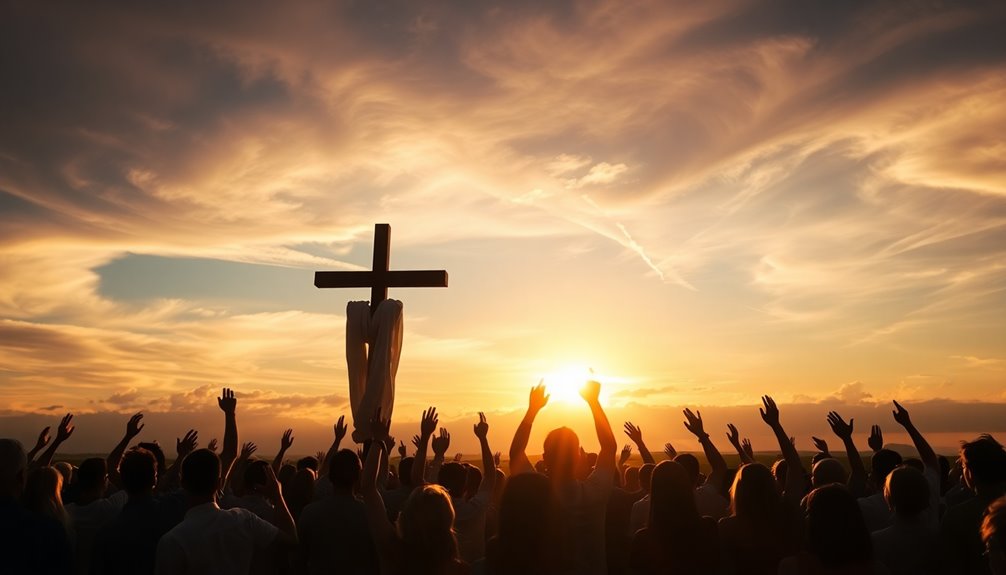The Day of the Lord is a significant biblical event representing God's decisive intervention in the world. It symbolizes both judgment for the wicked and hope for believers. You'll find it referenced throughout scripture, from the prophecies of Isaiah and Joel to the New Testament announcements of Christ's second coming. The Day offers a reminder of divine justice and mercy, assuring that trials are temporary, leading to ultimate restoration. Understanding its complexity enriches your faith and community worship. There's much more to uncover about its theological significance and implications, revealing deeper insights into God's ultimate plan for humanity.
Key Takeaways
- The Day of the Lord signifies God's intervention, embodying both judgment for the wicked and hope for salvation for the faithful.
- Key biblical references include Isaiah and Joel in the Old Testament, and the New Testament focuses on Christ's second coming.
- Theological significance includes divine sovereignty, justice, and mercy, emphasizing both punishment and salvation during this pivotal moment.
- Community worship practices encourage faith and support, fostering anticipation of redemption amid current trials.
- Eschatological themes in worship prepare believers for Christ's return, linking the Day of the Lord to God's ultimate plan.
Introduction

The "Day of the Lord" is a powerful concept rooted in biblical tradition, marking a time when God intervenes decisively in human affairs. This day signifies both judgment and restoration, serving as a pivotal moment in history.
You'll find references to the day of the Lord throughout the Old and New Testaments, with prophets like Isaiah and Joel highlighting its urgency. They call for preparation and repentance among the people, urging them to recognize the impending arrival of God's wrath.
In the New Testament, writings such as 1 Thessalonians and Revelation portray the day as unexpected and overwhelming, bringing divine consequences for the unrepentant.
The day of the Lord acts as a dual-edged sword; it delivers judgment to the wicked while simultaneously offering hope for salvation and a promise of new creation for the faithful remnant of God's people.
Cosmic upheaval and significant events characterize this day, symbolizing God's ultimate sovereignty over history. As you reflect on the day of the Lord, consider its implications for your life and the world around you, understanding that this divine intervention is both a warning and a promise.
Scriptural Insights on the Day

When you look at the Day of the Lord, the primary references in both the Old and New Testaments reveal a consistent theme of divine judgment and promise.
Books like Isaiah and Revelation highlight its significance, while secondary references in Amos and Zephaniah stress the urgency for preparation.
Understanding these scriptural insights helps you grasp the profound implications of this pivotal day.
Primary Bible References
Scriptural insights on the "Day of the Lord" reveal a profound theme of divine intervention and judgment woven throughout both the Old and New Testaments.
In the Old Testament, this phrase is prominently featured in books like Isaiah and Joel, signaling imminent divine judgment. For instance, Isaiah 13:6 warns of the great day of the Lord, urging the people of Israel to be ready for God's wrath. Joel 2:1 echoes this call, emphasizing the urgency for repentance as the day approaches.
Transitioning to the New Testament, the "Day of the Lord" shifts focus to the second coming of Christ. In 1 Thessalonians 5:2, it's described as an unexpected event, bringing divine retribution against the wicked.
Revelation also highlights the cosmic significance of this day, with imagery of celestial phenomena like the sun darkening and the moon turning blood red (Revelation 6:12). Malachi 4:1 further illustrates this theme of judgment, depicting the proud and evildoers facing destruction.
Ultimately, these references remind you that the day of the Lord encompasses both judgment for the unrepentant and salvation for the faithful, as hinted in Romans 11:26.
Secondary Bible References
How do secondary biblical references deepen our understanding of the "Day of the Lord"? These references illuminate the gravity and significance of this day, often portrayed as a day of wrath.
In Amos 5:18-20, you see it described as a day filled with darkness rather than light, warning God's people about impending judgment. This theme continues in 2 Peter 3:10, where it states that the Day of the Lord will come like a thief in the night, unexpectedly bringing destruction to the heavens and the earth.
Revelation 16:14 adds another layer, depicting a time when demonic spirits gather kings for battle at Armageddon, highlighting the eschatological importance of this day.
Paul's message in 1 Thessalonians 5:2-3 warns you to remain vigilant, as the sudden arrival of this day will catch many off guard, leading to swift destruction for those unprepared.
Furthermore, Joel 2:30-31, echoed in Acts 2:17-21, speaks of cosmic signs heralding the day, reinforcing its connection to God's promises and the outpouring of the Spirit.
Together, these references provide a fuller picture of the Day of the Lord, urging you to reflect on its implications.
Ancient Israelite Prophetic Traditions

Ancient Israelite prophetic traditions play a crucial role in understanding the concept of the "Day of the Lord," which is depicted as a time of both judgment and hope. The prophets frequently emphasized this day as a moment of impending judgment, filled with vivid images of natural disasters and cosmic upheaval. For instance, Isaiah and Joel describe the tumult that accompanies divine intervention, warning that this day signifies punishment for Israel's sins.
However, it's not all doom and gloom. Prophets like Amos and Zephaniah also assure a remnant of faithful believers will experience restoration. They highlight the duality of the Day of the Lord: it's a day of wrath against the wicked and a time of deliverance for the righteous. This is evident in passages where the Day of the Lord connects to a divine warrior conquering Israel's enemies, showcasing Yahweh's sovereignty over all nations.
Importantly, these prophetic messages stress the urgency for repentance. The call for societal justice and a return to covenant faithfulness resonates throughout their writings, reminding you of the significance of aligning with divine expectations before the Day of the Lord arrives.
Theological Significance Explored

The significance of the Day of the Lord extends far beyond its portrayal as a time of judgment; it encapsulates the profound theological themes of divine sovereignty, justice, and mercy.
You'll notice that this day represents a pivotal moment in history where God intervenes, showcasing His authority over creation. In both the Old and New Testaments, the Day of the Lord is tied to cosmic upheaval and God's wrath, urging believers to maintain vigilance and seek repentance.
Prophetic texts reveal a duality in this day—while it brings punishment for the wicked, it also offers salvation for the faithful remnant. This highlights God's just nature, balancing His wrath against pride and rebellion with an opportunity for renewal and redemption.
The imagery of cataclysmic events serves as a sobering reminder of the serious implications of turning away from God.
In the New Testament, the Day of the Lord connects to Christ's second coming, emphasizing a final reckoning for all creation. Through this lens, you see the hope of eternal life for those who obey the gospel, reaffirming that God's mercy triumphs alongside His justice.
Misunderstanding the Day's Timing

When it comes to the Day of the Lord, you might've some misconceptions about its timing.
Many people think it's a specific date, but the reality is much more complex, blending immediate judgments with future events.
Understanding this dual nature can help clarify prophetic messages and their significance in your faith journey.
Debunking Common Misconceptions
Many people mistakenly view the Day of the Lord as a singular event that happens at a specific moment in time. This misunderstanding often leads to confusion about the nature and timing of God's wrath. Scholars emphasize that the Day encompasses both immediate and distant events throughout history, meaning it's not just a single day.
The Old Testament prophets, like Joel and Amos, painted a picture of the Day as a time of judgment that can manifest in various forms, revealing that its timing isn't straightforward.
In the New Testament, references such as 1 Thessalonians 5:2 highlight the unexpected nature of the Day of the Lord. It suggests that it won't align with human expectations, reinforcing that this Day could come upon us suddenly. The idea of a "thief in the night" in 1 Thessalonians underscores this unpredictability, indicating that it's less about a specific day and more about being prepared for its sudden arrival.
Finally, the Day of the Lord serves a dual purpose as both judgment and salvation, ultimately fulfilling God's promises and establishing His sovereignty. Understanding this complexity can help clarify misconceptions about the Day's significance.
Timing of Prophetic Events
Understanding the Day of the Lord's nature leads to a clearer view of its timing, which is often misunderstood. Many people get confused because biblical prophecies indicate that the Day encompasses both immediate judgments and distant future events.
Old Testament prophets like Isaiah and Joel spoke of it as imminent, signaling coming judgments for Israel. However, New Testament writings suggest it'll arrive unexpectedly, much like a thief in the night, as noted in 1 Thessalonians 5:2.
Scholars debate whether the Day of the Lord is a singular event or a series of overlapping occurrences, which complicates interpretations of its timing and significance. You can see this dual nature reflected in the prophetic timeline that includes near fulfillments, such as historical judgments against Israel, as well as ultimate fulfillments at the end of history.
Recognizing the Day's timing requires understanding its role as a time of reckoning, encompassing both judgment and salvation for nations and individuals alike. This concept is reinforced in scriptures like Malachi 3:1-2 and Revelation 16:14, urging you to consider the broader picture of the Day of the Lord.
Living With Eschatological Hope

Living with eschatological hope means finding strength in daily challenges, knowing that Christ's return is near.
It also encourages you to engage in community worship practices that uplift and inspire one another.
Together, you can foster a deeper faith as you await the ultimate promise of redemption.
Hope in Daily Challenges
Hope in daily challenges can transform your perspective, especially when you embrace eschatological hope. Recognizing that the Day of the Lord signifies divine intervention and ultimate restoration empowers you to remain steadfast during tough times. As God's people, you can draw strength from the promise of salvation and God's unwavering presence, which inspires perseverance through life's difficulties.
Eschatological hope reminds you that current trials are temporary. The final Day of the Lord will bring justice and peace, allowing you to face challenges with resilience. You can find comfort in scriptures that speak of renewal, like Isaiah 65:19, which reassures you of a brighter future.
Moreover, the expectation of Christ's return encourages you to live with daily vigilance. This hope influences your moral choices and actions, pushing you toward righteous living. Embracing the reality of future judgment also motivates you to share your faith and extend compassion to others, fostering a sense of community amidst adversity.
Community Worship Practices
Community worship practices embody the essence of fellowship and strengthen your connection to eschatological hope. Early Christians observed Sunday as the Lord's Day, transitioning from the Jewish Sabbath to celebrate Jesus' resurrection. Gathering for worship and communion, they embodied the communal spirit emphasized in the Didaché, which encourages believers to meet weekly for breaking bread and giving thanks.
Meredith Kline highlights the significance of the Lord's Day as a time for celebrating God's redemptive acts while anticipating His future promises. When you engage in community worship, you foster an atmosphere of mutual encouragement, prayer, and the sharing of spiritual gifts, as outlined in Hebrews 10:23-25. This practice not only builds relationships but also reinforces your collective eschatological hope, reminding you that each gathering is a step closer to Christ's return.
The observance of the Lord's Day serves as a vital reminder to remain watchful and ready, instilling a sense of urgency and purpose in your spiritual life. By participating in community worship, you actively live out these eschatological truths, deepening your faith and connection with others in the body of Christ.
Eschatological Themes in Worship

Eschatological themes in worship invite believers to engage deeply with the anticipation of Christ's return and the fulfillment of God's promises. The Day of the Lord serves as a central focus, reminding you that God's ultimate plan encompasses both judgment and salvation.
As early Christians gathered on the Lord's Day, they commemorated the resurrection of Jesus, linking this celebration to their hope in the eschatological return of the Lord. Worship practices during this time included communal prayer, communion, and teachings that emphasized the imminent nature of the Day of the Lord, as highlighted in texts like 1 Thessalonians 5:2.
The Didaché encourages you to come together for thanksgiving, reinforcing the significance of communal worship in light of these eschatological expectations. In your worship, you embody themes of repentance and readiness, recognizing that God's final judgment will bring transformation and renewal.
Engaging in these practices not only strengthens your faith in the present but also prepares your heart for the glorious day when the Lord comes to restore all creation. Embracing these themes deepens your relationship with God and fuels your hope for His coming kingdom.
Additional Resources

To deepen your understanding of the "Day of the Lord," a wealth of resources is available that bridges both scholarly insights and practical applications. You can explore the interpretations provided by authors like Coogan, Wright, and DeRouchie. These works delve into the historical and theological implications of this significant biblical concept.
For a more hands-on approach, online platforms like the Humanities Text Initiative offer access to various biblical texts, including the King James Version. This makes it easier for you to study the references to the day of the LORDs throughout both the Old and New Testaments.
Additionally, the Didaché serves as an early Christian document that emphasizes the importance of gathering on the Lord's Day, showing how worship practices evolved from the Jewish Sabbath to the new understanding of the "Day of the Lord."
To further enhance your study, consider educational materials like tutorials and FAQs on biblical search tools. They can help clarify complex themes and improve your access to scriptures related to the "Day of the Lord," ensuring you grasp this crucial aspect of faith and prophecy.
Frequently Asked Questions
What Is the Day of the Lord in the Bible?
In the Bible, the "Day of the Lord" refers to a significant time when God intervenes in human history.
It's often depicted as a moment of judgment and restoration, emphasizing the need for repentance.
You'll find prophecies about this day in both the Old and New Testaments, highlighting cosmic upheaval and divine warfare.
Ultimately, it serves as a warning for the unrepentant while offering hope and salvation to the faithful.
What Is the Day of the Lord in 1 Thessalonians 5?
In 1 Thessalonians 5, Paul emphasizes the unexpected nature of the coming day, urging you to stay vigilant.
He contrasts those who feel secure with those who are prepared, warning that destruction will surprise the unrepentant.
As a believer, you're called to be alert and sober, embodying the light.
This passage reinforces the urgency of living righteously, reflecting your hope and readiness for Christ's return amidst the uncertainty surrounding you.
Is the Day of the Lord and the Rapture the Same?
No, the Day of the Lord and the Rapture aren't the same.
The Rapture refers to the moment believers are taken up to meet Christ, focusing on salvation and hope.
In contrast, the Day of the Lord involves divine judgment and cosmic upheaval, affecting the wicked.
While both are part of God's ultimate plan, they represent different events with distinct purposes and timelines in biblical prophecy.
Understanding this distinction is crucial for your study of eschatology.
What Does the Day of the Lord Mean in Isaiah 2?
In Isaiah 2, you see a vivid depiction of a future time when God's judgment addresses human pride and reliance on strength.
It calls you to recognize the futility of arrogance, urging you to humble yourself. The passage also offers hope, as nations will seek God, symbolizing restoration and unity.
Ultimately, it challenges you to reflect on your actions and their consequences while holding onto the promise of peace and divine reign.










